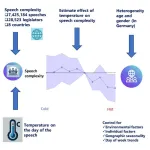(Press-News.org) Québec City, June 13, 2024–Increased use of blood transfusions after major traumatic brain injury could help people hospitalized in intensive care units regain greater functional independence and a better quality of life.
Six months after a major traumatic brain injury (TBI), patients who benefited from this approach regained more functional independence and had a better quality of life than those subjected to a more restrictive approach, even though the combined incidence of death and major disability was not significantly different between the two treatment groups.
This is the conclusion of an international research team led by Alexis Turgeon, professor at Université Laval, Canada Research Chair in Neurological Critical Care and Trauma, critical care physician and researcher at CHU de Québec-Université Laval, whose work is published today in the New England Journal of Medicine.
"This randomized clinical trial, initiated in 2017, was carried out in 34 hospital centres in Canada, the United Kingdom, France and Brazil. Its aim was to compare two blood transfusion strategies - one so-called restrictive and the other liberal - employed to care for people hospitalized in an intensive care unit following a TBI. These approaches differ in the degree of anemia, or the minimum hemoglobin concentration that must be present in patients' blood before a blood transfusion can be given," explains Professor Turgeon.
"The hemoglobin enables red blood cells to carry oxygen to the tissues and organs. Most patients hospitalized after a TBI suffer from anemia, defined as low hemoglobin concentration, which could reduce oxygen transport to the brain during a period when it is most vulnerable," points out François Lauzier, also a professor at Université Laval and who co-led the study with Professor Dean Fergusson of the Ottawa Hospital Research Institute.
The restrictive approach consists in tolerating a low hemoglobin level before giving a transfusion, while a liberal approach aims to maintain high hemoglobin levels, thus giving more blood transfusion.
"By improving oxygen transport to the brain during the acute phase of care, it may be possible to save more nerve cells in the days following a TBI, thereby preventing additional brain damage," says Professor Turgeon.
To conduct the study, the research team recruited 742 critically ill patients with moderate or severe TBI and anemia defined as a hemoglobin level of 10 g/decilitre or less during hospitalization. Randomly divided into two groups, these individuals were subjected to one or other of the transfusion strategies during their stay in the intensive care unit. To maintain these thresholds, the care teams administered blood transfusions whenever necessary.
Six months after TBI, the research team assessed the level of overall recovery for each group, including neurovegetative status, dependence on activities of daily living and impairments preventing resumption of activities that had been performed prior to TBI. "The combined incidence of death and major disability was not statistically different between the two groups, but seemed favouring the liberal strategy in all analyses," says Professor Turgeon. What's more, those treated using the liberal approach showed a higher functional independence measure and quality of life index than those treated using the restrictive approach.
"In light of the overall results of our study and considering the safety of current blood transfusions, the liberal strategy is probably the option that should be preferred in the acute phase of care to improve long-term prognosis following TBI," concludes Professor Turgeon.
-30 -
For information and interview requests:
Alexis Turgeon
Professor, Université Laval
alexis.turgeon@crchudequebec.ulaval.ca
END
After major traumatic brain injury, more blood transfusions could mean better outcomes
2024-06-13
ELSE PRESS RELEASES FROM THIS DATE:
Low-dose glucocorticoids in SLE
2024-06-13
In a session on diagnosing and managing complex diseases at the 2024 EULAR congress in Vienna, two abstracts tackled this issue.
First, Filippo Vesentini presented on the risk of flare with glucocorticoid compared to low-dose maintenance – based on a retrospective analysis of prospectively collected data from people with SLE. Flare-free remission and predictors of such were evaluated respectively in remitted patients on and off glucocorticoids.
During follow-up, 484 patients achieved remission at least once during ...
Implementing physical activity recommendations
2024-06-13
An HPR abstract sessions at the 2024 EULAR congress looked specifically at harnessing the benefits of exercise in rheumatic and musculoskeletal diseases (RMD) – and the challenges to their practical implementation.
Mohamed Saadi presented a systematic review examining barriers and facilitators affecting adherence to EULAR’s physical activity recommendations. Across 68 selected articles, 29 different themes were identified – 9 of which were social, 16 environmental, and 4 systemic. The five most frequently found themes were having supportive family and friends, a supportive health professional, followed by costs, and access or proximity to adapted and ...
Achieving drug-free remission in AXSPA
2024-06-13
Even though early therapeutic interventions have proven successful in inducing drug-free remission in other inflammatory rheumatic diseases, such studies remain difficult to conduct in axial spondyloarthritis (axSpA), which manifests itself by insidious onset inflammatory back pain. As a result it is often diagnosed late,5 and a consensus definition of early disease was only recently published.6
At the 2024 EULAR congress, Łukasik and colleagues shared data from their prospective study evaluating the efficacy of a ...
Unpicking the pathogenesis of RA
2024-06-13
Rheumatoid arthritis (RA) is an autoimmune disease that causes joint inflammation and destruction.1 There is currently no cure – and although there are many treatments, their effectiveness varies from person to person, suggesting an undefined pathogenic diversity.1 Deep characterisation of myeloid cell subsets by single cell RNA sequencing across healthy and inflamed tissues in RA has led to the identification of new pathogenic cell states and subsets – with data coming from five large-scale studies.1-5 But subset overlap across studies and compartments – such as in blood versus synovial tissue – has not yet ...
Kids First DRC launches enhanced data portal to strengthen collaborative pediatric research
2024-06-13
The Gabriella Miller Kids First Data Resource Center (Kids First DRC) announces the release of an upgraded Kids First Data Resource Portal, designed to streamline big data search and data analysis. Accessible at portal.kidsfirstdrc.org, the new portal represents a significant advancement in data accessibility, user experience, and collaborative potential with researchers, families, and patients.
Elevated User Experience
Introducing several key enhancements, the new Kids First DRC Portal prioritizes user-centric ...
Neural balance in the brain is associated with brain maturity and better cognitive ability
2024-06-13
In a world where external and internal stimuli can throw our entire body system off balance, how does our brain prevent itself from becoming overly stimulated?
The answer lies in our brain’s ability to maintain the balance of neural excitation (E) and inhibition (I), known as the E/I ratio. By regulating the E/I ratio, the brain prevents over-stimulation and under-stimulation.
The E/I ratio of children decreases with healthy development. Children with a lower E/I ratio were observed to have better performance than their peers in cognitive tests such as memory and intelligence, according to studies by researchers from the Centre for Sleep and Cognition ...
Parliamentary members use simpler language on hot days
2024-06-13
Climate change has many widespread and complicated effects on the well-being of people and the planet, and a new study in iScience on June 13 has now added a surprising one to the list. After analyzing the language used in seven million parliamentary speeches around the world, it shows that high temperatures lead to a significant and immediate reduction in politicians’ language complexity.
The results suggest that rising heat may come with impacts on our cognitive abilities with real and immediate consequences, the researchers say. The study also showcases ...
Food: Greater gender equality associated with men eating meat more frequently than women
2024-06-13
Men tend to eat meat more frequently than women and the extent of the differences in meat consumption frequency between both genders tend to be greater within countries with higher levels of gender equality and social and economic development, according to a study published in Scientific Reports. The authors suggest that this could be due individuals within these countries having greater opportunities to express food preferences.
Christopher Hopwood and colleagues investigated differences in meat consumption between men and women across countries with differing levels of social ...
Antipsychotic medications don’t just stop working below the neck
2024-06-13
PITTSBURGH, June 13, 2024 – New University of Pittsburgh research points to a potential approach to reducing the risk of diabetes associated with widely prescribed antipsychotic medications.
The study presents early evidence in support of co-administering antipsychotic medications that block dopamine receptors in the brain alongside drugs that stop antipsychotics from blocking those same receptors in the pancreas. This approach, published today in Diabetes, could limit metabolic side effects, including impaired control over blood sugar, or dysglycemia.
This research may also explain why weight control medications, including new neuropeptide drugs Wegovy and Ozempic, may not ...
New study: Outdoor recreation noise affects wildlife behavior and habitat use
2024-06-13
FORT COLLINS, Colo., June 13, 2024 — We may go to the woods seeking peace and quiet, but are we taking our noise with us? A recent study published in the journal, Current Biology, led by scientists from the USDA Forest Service Rocky Mountain Research Station indicates that the answer is yes—and that this noise can trigger a fear response, as if escaping from predators. This new science calls into question whether otherwise high-quality habitat truly provides refugia for wildlife when recreationists are present and underscores the challenges land managers face in balancing ...



